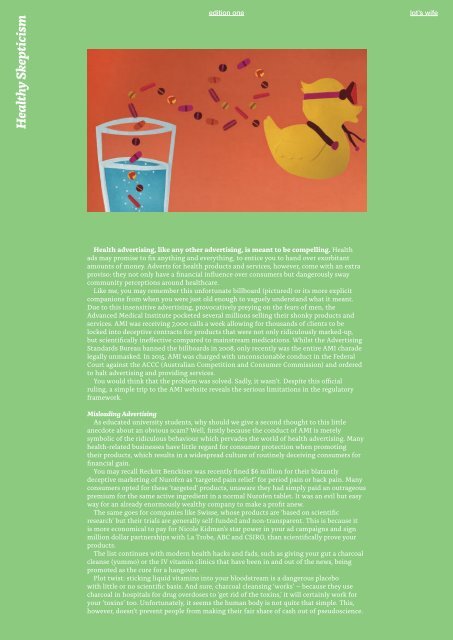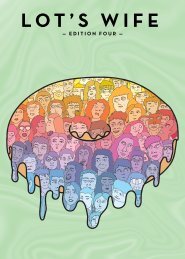Lot's Wife Edition 1 2017
Create successful ePaper yourself
Turn your PDF publications into a flip-book with our unique Google optimized e-Paper software.
Healthy Skepticism<br />
edition one<br />
lot’s wife<br />
Health advertising, like any other advertising, is meant to be compelling. Health<br />
ads may promise to fix anything and everything, to entice you to hand over exorbitant<br />
amounts of money. Adverts for health products and services, however, come with an extra<br />
proviso: they not only have a financial influence over consumers but dangerously sway<br />
community perceptions around healthcare.<br />
Like me, you may remember this unfortunate billboard (pictured) or its more explicit<br />
companions from when you were just old enough to vaguely understand what it meant.<br />
Due to this insensitive advertising, provocatively preying on the fears of men, the<br />
Advanced Medical Institute pocketed several millions selling their shonky products and<br />
services. AMI was receiving 7,000 calls a week allowing for thousands of clients to be<br />
locked into deceptive contracts for products that were not only ridiculously marked-up,<br />
but scientifically ineffective compared to mainstream medications. Whilst the Advertising<br />
Standards Bureau banned the billboards in 2008, only recently was the entire AMI charade<br />
legally unmasked. In 2015, AMI was charged with unconscionable conduct in the Federal<br />
Court against the ACCC (Australian Competition and Consumer Commission) and ordered<br />
to halt advertising and providing services.<br />
You would think that the problem was solved. Sadly, it wasn’t. Despite this official<br />
ruling, a simple trip to the AMI website reveals the serious limitations in the regulatory<br />
framework.<br />
Misleading Advertising<br />
As educated university students, why should we give a second thought to this little<br />
anecdote about an obvious scam? Well, firstly because the conduct of AMI is merely<br />
symbolic of the ridiculous behaviour which pervades the world of health advertising. Many<br />
health-related businesses have little regard for consumer protection when promoting<br />
their products, which results in a widespread culture of routinely deceiving consumers for<br />
financial gain.<br />
You may recall Reckitt Benckiser was recently fined $6 million for their blatantly<br />
deceptive marketing of Nurofen as ‘targeted pain relief’ for period pain or back pain. Many<br />
consumers opted for these ‘targeted’ products, unaware they had simply paid an outrageous<br />
premium for the same active ingredient in a normal Nurofen tablet. It was an evil but easy<br />
way for an already enormously wealthy company to make a profit anew.<br />
The same goes for companies like Swisse, whose products are ‘based on scientific<br />
research’ but their trials are generally self-funded and non-transparent. This is because it<br />
is more economical to pay for Nicole Kidman’s star power in your ad campaigns and sign<br />
million dollar partnerships with La Trobe, ABC and CSIRO, than scientifically prove your<br />
products.<br />
The list continues with modern health hacks and fads, such as giving your gut a charcoal<br />
cleanse (yummo) or the IV vitamin clinics that have been in and out of the news, being<br />
promoted as the cure for a hangover.<br />
Plot twist: sticking liquid vitamins into your bloodstream is a dangerous placebo<br />
with little or no scientific basis. And sure, charcoal cleansing ‘works’ – because they use<br />
charcoal in hospitals for drug overdoses to ‘get rid of the toxins,’ it will certainly work for<br />
your ‘toxins’ too. Unfortunately, it seems the human body is not quite that simple. This,<br />
however, doesn’t prevent people from making their fair share of cash out of pseudoscience.<br />
A Failing System

















